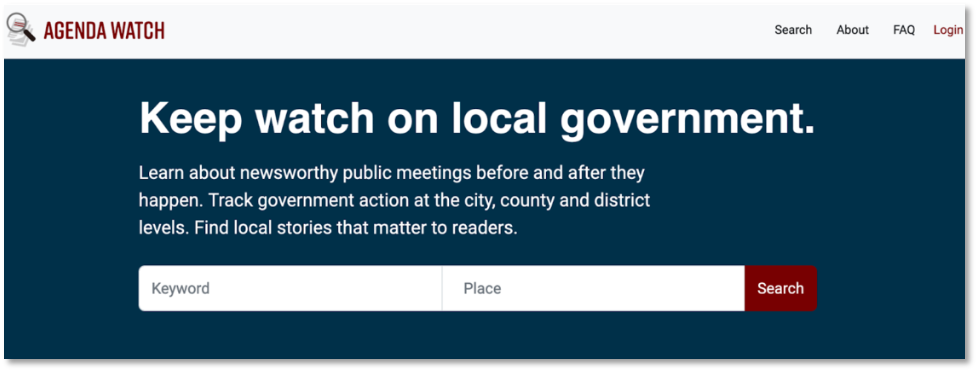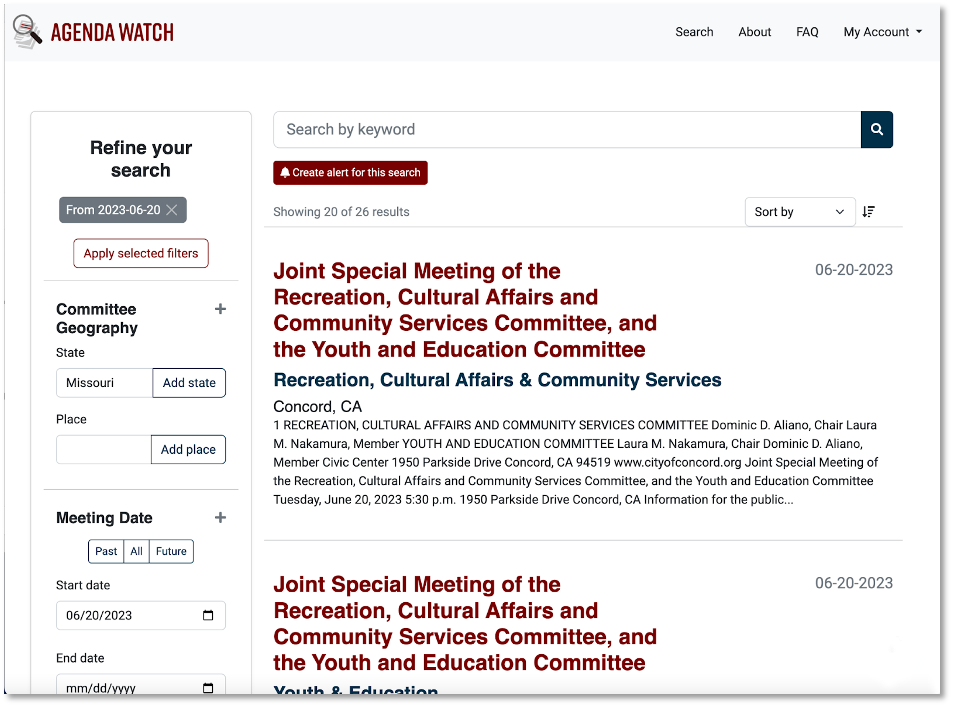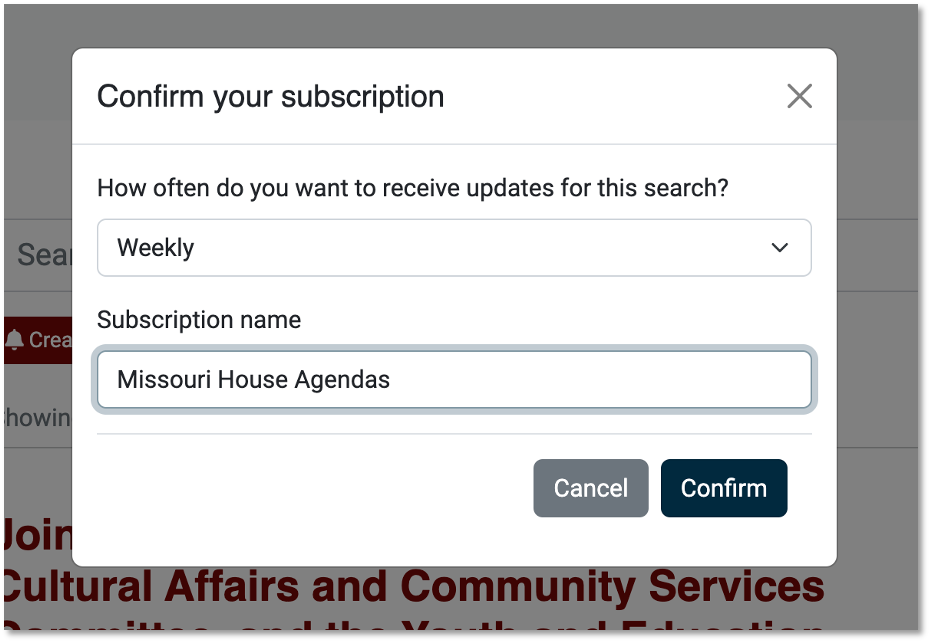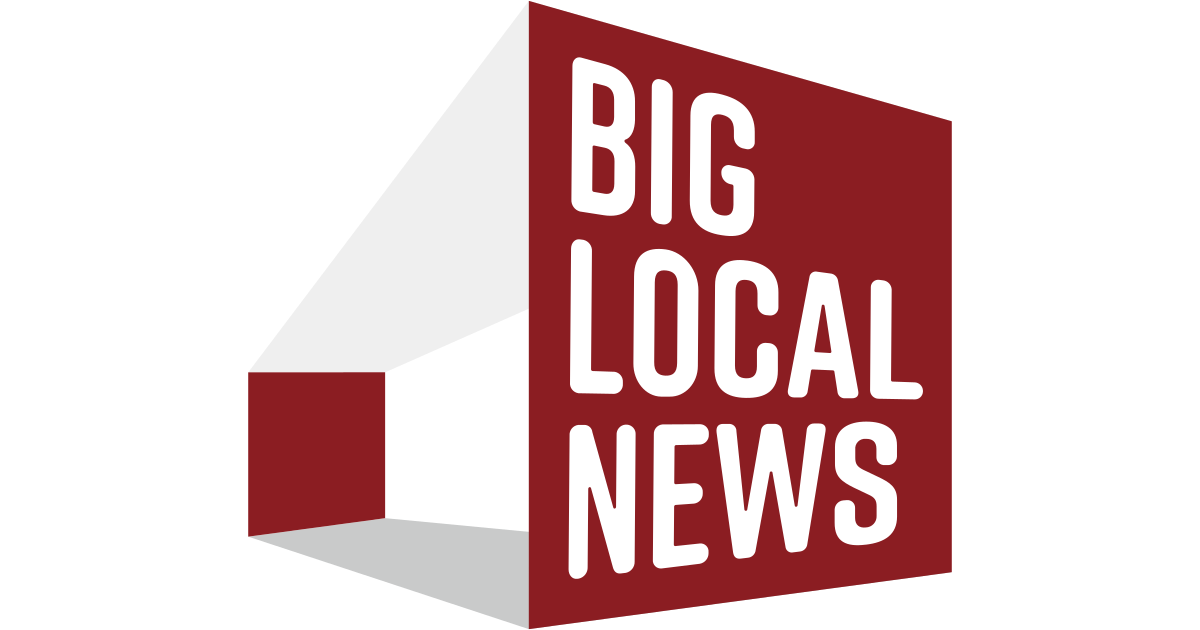Welcome to Agenda Watch, a platform to help journalists keep watch on local government
Trying to keep tabs on contractors scooping up bids in the region? School boards discussing CRT? The latest big box store angling to build in your town? Agenda Watch has you covered.
 The new Agenda Watch platform.
The new Agenda Watch platform.
The new Agenda Watch platform, built by Big Local News at Stanford University and the Reynolds Journalism Institute, is now live to help journalists shine a light on local government. By law, public agencies must post notice of upcoming discussions (agendas) and provide a record of their meetings (minutes). Agenda Watch harvests those documents on a daily basis from agencies across the country. You can research topics of interest on the platform and subscribe to receive alerts when similar items crop up in new documents.
Agenda Watch is designed by and for local reporters. Many of us have spent late nights in city council and school board meetings, waiting for a vital public issue to come up for discussion. And many of us have missed important public meetings because there simply are too many to cover.
Government doesn’t slow down for the public, but our hope is that Agenda Watch will enable journalists and the public to keep a closer eye on decisions that affect their communities.
How to use it
When you first begin to use Agenda Watch, you’ll be directed to create a MuckRock account. Folks from the news community may be familiar with MuckRock’s FOIA tracking service as well as DocumentCloud, a site that helps reporters upload their own documents for research and publishing. Our partners at MuckRock graciously agreed to bring our new platform into their ecosystem, so you can use the same login credentials on Agenda Watch as other projects under the MuckRock umbrella. If you already have a MuckRock account, you’ll be prompted to log in. Otherwise, you set up a new Muckrock account. Once you’ve done that, you can log into Agenda Watch at https://agendawatch.org.
The platform currently hosts documents from a small group of agencies in four regions: Atlanta/Georgia, Philadelphia/Pennsylvania, Los Angeles, and the San Francisco Bay Area.
We plan to scale to many more states and agencies over the next few months, but we invite you to explore the site now to get familiar with the features.
From our homepage you can search for documents containing keywords or phrases such as “affordable housing,” “crime,” “environmental cleanup” – basically any topic relevant to your beat or interests. You can limit searches by place from the home page as well.
For more advanced search, head over to the search page, where you can filter queries by multiple parameters – including geography, committee type and meeting dates.

Once you’ve created a search that returns the documents you need, you can subscribe to get email notifications when new documents that match that search are scraped. You can choose to receive notifications based on your own preferences: real-time, daily, or weekly.

Of course, there’s no need to sign up for alerts. If you just want to use Agenda Watch as a research tool, that’s fine as well. All documents found on Agenda Watch are also hosted on DocumentCloud. If you need more powerful research features, such as the ability to annotate documents or publish a searchable set of documents on your website, we encourage you to head over to our public project on DocumentCloud.
To see a demo of Agenda Watch and ask questions, join us for our webinar July 12th at 11am CST.
Next steps
Over the next few months, we plan to rapidly expand Agenda Watch’s coverage to thousands of agencies across the country. We have a formidable list of 90,000-plus agency sites - from city councils to school boards to water districts, so we expect this to be a multi-year process of expanding our coverage areas to serve all the communities who want this tool.
Our scraping operation is powered by the open source civic-scraper framework. At the moment, we have support for a handful of software platforms commonly used by local governments to post agendas and other public documents. Many agencies, of course, have unique sites that will require one-off scrapers, but our hope is that by targeting platforms that are used by multiple government agencies, we’ll capture a lot of the easy-to-scrape documents early on.
Agenda Watch is kicking off by gathering documents from agencies that post documents on CivicPlus, one of the most widely used platforms (check out our public list of CivicPlus sites to see if any of your local agencies use the platform). We’ll focus next on a handful of other common platforms that we can currently scrape: Legistar, Granicus, CivicClerk, and PrimeGov.
We plan to work with our open source community on an ongoing basis to add support for additional platforms – there are quite a few out there!
We welcome code contributions from folks interested in a particular platform or agency. By joining forces, we hope to make substantial progress on the goal of nationwide coverage over the next few years.
Whether or not you’d like to contribute code, we’re eager to partner with newsrooms, citizen journalists, civic coders and others interested in keeping tabs on local government. In particular, we encourage you to reach out if you’re interested in areas with little or no news coverage and/or underserved communities.
If we don’t already cover your agency or area, fill out this form so we can consider you for our priority list for scraping. Or if you want to chat with us about Agenda Watch, please reach out @BigLocalNews or via email. We’d love to hear from you!
Lastly, we’d like to give a huge thanks to our supporters. Agenda Watch would not be possible without financial support from the Brown Institute for Media Innovation, Lenfest Foundation, The Associated Press and The Los Angeles Times. Over the last few years, we’ve also received a great deal of feedback from the Atlanta Journal Constitution, The Philadelphia Inquirer, and Bay City News, to name a few. We appreciate your support along the way, and stay tuned – there’s much more to come!
About Big Local News

From its base at Stanford University, Big Local News gathers data, builds tools and collaborates with reporters to produce journalism that makes an impact. Its website at biglocalnews.org offers a free archiving service for journalists to store and share data. Learn more by visiting our about page.








